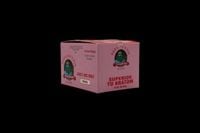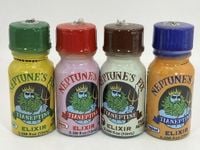Brightly colored bottles labeled as energy shots or cognitive supplements have become a common sight at gas stations, convenience stores, and smoke shops across the United States. Marketed under names like Zaza, Tianaa, Pegasus, TD Red, and Neptune's Fix, these products contain tianeptine, an unapproved and potentially dangerous drug that has alarmed health officials nationwide.
Often referred to as "gas station heroin," tianeptine is not approved by the U.S. Food and Drug Administration (FDA) for any medical use in the country. While it is prescribed as an antidepressant in some foreign nations, in the U.S., it remains illegal to sell tianeptine as a food additive or dietary supplement. Despite this, under-the-radar companies continue to market and sell these products without proper regulation, leading to a significant public health concern.
Experts warn that tianeptine mimics opioid effects by binding to some of the same brain receptors as drugs like oxycodone, although it is not classified as an opioid. This similarity results in potentially dangerous side effects, including slow or depressed breathing, rapid heartbeat (tachycardia), low blood pressure, seizures, and severe distress. According to Dr. Diane Calello of the New Jersey Poison Information and Education System, "It's kind of this grey area of consumer products, or supplements, where the contents are not regulated or tested the way they would be with a medication." She further cautions, "You never quite know what's in that bottle. Even if they have used a product before, they could get a bottle that contains something very different from what they're looking for." In fact, some products have been found to contain hidden substances like synthetic cannabis, compounding the risks.
Use of these products is often driven by misleading claims that they can treat medical conditions such as addiction, pain, and depression. For example, in 2018, the FDA issued a warning letter to the maker of Tianna, which falsely claimed to provide "an unparalleled solution to cravings for opiates." Dr. Hannah Hays of Nationwide Children's Hospital in Columbus, Ohio, explains, "People use it for opioid-like effects or to self-treat opioid withdrawal, and that can lead to slow breathing and problems like that." This self-medication approach without medical oversight significantly increases the risk of adverse outcomes.
The surge in tianeptine-related health emergencies has been dramatic. U.S. poison control centers reported a staggering 525% increase in calls involving tianeptine between 2018 and 2023. In 2024 alone, poison control centers managed 350 incidents related to tianeptine, up from just four in 2013. Approximately 40% of these cases required medical care, with more than half of those needing critical or intensive treatment. For instance, a 2024 study in New Jersey documented a cluster of emergency calls linked to Neptune's Fix, where patients experienced symptoms severe enough to warrant intensive care admissions for more than a dozen out of 20 cases.
The FDA has responded to this growing crisis with multiple warnings over the years, most recently in May 2025, emphasizing the increasing reports of adverse reactions and the drug's unapproved status. The agency labeled tianeptine "a dangerous and growing health trend" and urged swift action to prevent a potential opioid-style epidemic. The FDA also highlighted the sharp increase in adverse events, including deaths, particularly among young users.
Despite not being federally scheduled under the Controlled Substances Act, several states have taken matters into their own hands. About a dozen states, including Alabama, Georgia, Michigan, Minnesota, Ohio, and Tennessee, have passed laws prohibiting or restricting tianeptine. Alabama, notably, experienced a 1,400% rise in tianeptine-related poison control calls between 2018 and 2021, the highest rate in the southern U.S. After the state imposed restrictions in 2021, these calls began to modestly decline, while other southern states without such restrictions saw continued increases. However, these laws have also led to reported cases of withdrawal symptoms among users due to the drug's addictive nature.
Health experts strongly advise against using any products containing tianeptine, especially those purchased over the counter without medical supervision. They emphasize seeking FDA-approved treatments for conditions such as addiction, pain, or depression rather than relying on unregulated supplements that carry significant health risks. The widespread availability of these products at gas stations and convenience stores poses an additional danger, as some individuals may consume them before driving, impairing their ability to operate vehicles safely.
In summary, the rise of "gas station heroin"—brightly packaged tianeptine products sold without approval or regulation—represents a growing public health challenge in the United States. With increasing emergency calls, severe health effects, and a lack of federal scheduling, the situation demands heightened awareness, regulatory action, and informed medical guidance to protect consumers from this hidden danger.


